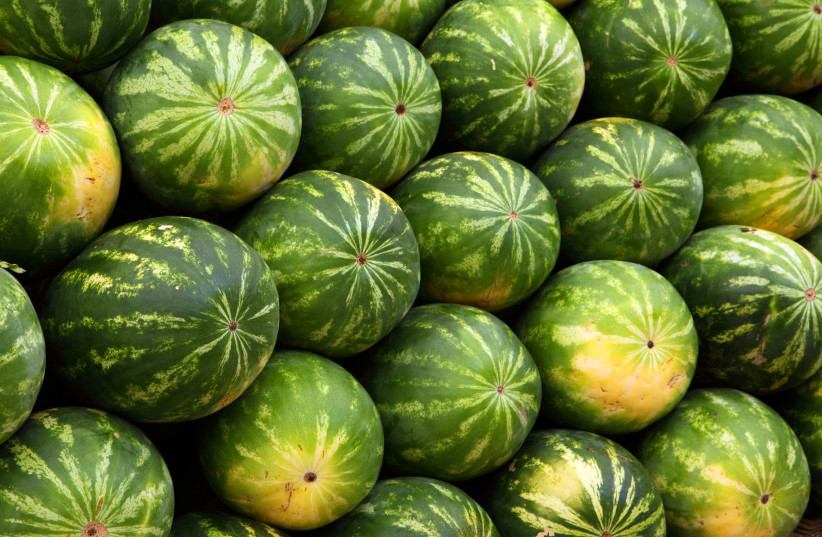Watermelon is perhaps one of the most delicious, beautiful and joyful signs of summer. Did you know it also contains a good amount of vitamins and is especially rich in lycopene and other antioxidants such as vitamin C?
What do we know about watermelon?
Despite its sweet taste, the sugar content of watermelon isn’t too high, and it is low in calories due to its high liquid content; a serving of 100 grams of watermelon has only 30 calories.
A 100-gram serving of watermelon has 92 grams of water, 0.61 grams of protein, close to 8 grams of carbohydrates and 0.15 grams of fat. Also, it has minerals like iron, calcium, potassium and phosphorus.
Here are all the benefits of the most Israeli fruit there is:

Heart-healthy
Watermelon contains an amino acid (protein) called citrulline which increases the production of another substance in the body called nitrogen-oxygen and encourages vasodilation (widening of arteries) which helps lower blood pressure.
Many studies have found that this amino acid is linked to lowering the risk of heart attacks but lifestyle is the main factor affecting heart health so exercise, avoiding smoking, eating a Mediterranean diet, reducing stress and good sleep — all affect heart health.
Citrulline is an amino acid (protein) that’s a popular ingredient in athletes’ dietary supplements because it increases nitrogen oxide production which increases lactic acid clearance and streamlines various skeletal muscle processes.
Loaded with lycopene
The red color of watermelon comes from lycopene, a powerful antioxidant. Studies show that antioxidants reduce the risk of certain cancers, diabetes and other diseases. Watermelon has more lycopene than any other fruit or vegetable — even tomatoes.
To get more lycopene, choose a red watermelon as bright and ripe as possible. Also, seedless watermelons tend to have more lycopene than those with seeds.
Protects your joints
Watermelon has another natural pigment (another dye besides lycopene) called beta-cryptoxanthin (this is a yellow-orange pigment from the carotenoid family) which is linked to reducing the risk of heart disease and may protect the joints from inflammation.
Several studies have shown that eating watermelon over time can reduce the chance of developing arthritis.
Maintains eye health
One medium slice of watermelon contains 9-11% of the amount of vitamin A the body needs each day. This vitamin is one of the keys to maintaining eye health.
Hydration is naturally sweet
Juicy watermelon contains 92% water, so this is a simple way to help maintain hydration. However, make sure you drink enough and don’t just eat watermelon and other fruits to saturate yourself inside. There’s no substitute for water.
Satisfies the craving for sweets
Compared to other sweets that contain sugar or sugar substitutes, other processed ingredients and are sometimes high in calories a cup of watermelon cubes is a low-calorie sweet dish, with no processed ingredients and unlike many other desserts, it’s fat-free, cholesterol-free, and has no sodium.
You can eat hard cheese cubes /yogurt/nuts or almonds with it to increase the feeling of satiety.
Easy to digest
If you suffer from various digestive problems, the list of what not to eat can be long but you can definitely try to put watermelon on your "yes" list. This fleshy fruit is easy to digest and you can test how your body reacts. If you need to limit fiber intake don’t eat the peel or seeds.
Sugar amount
An amount of 200 grams has about 15 grams of carbohydrates per serving. For comparison, 100 grams of apple has 15 grams of carbohydrates so an apple contains 2 times more carbohydrates.
Why is there a stigma that watermelon raises blood sugar?
The reason there is a stigma that watermelon raises blood sugar is that most people eat serving several times larger than 200 grams of watermelon, so the amount of accumulated sugar is large and burdens the pancreas. If you have diabetes and want to eat watermelon, eat a moderate amount similar to the amount listed here.
Eat it separately, not with another meal and examine its effect on your blood sugar level with a continuous sugar meter without punctures or with a glucometer.
Another option is to add protein (cheese/yogurt) or fat (almonds/nuts) which will reduce its glycemic index and probably cause it to break down slowly, so that the sugar reaches the blood more slowly.
Despite the common belief that watermelon is forbidden for diabetics, experience has shown that for many diabetics, it doesn’t raise sugar significantly as long as one fruit serving is eaten at a time.
Fruit is always the best sweet; check how your body responds to various fruits using sugar measurements. Choose a watermelon that looks clean but was the rind before you slice it.
Einat Mazor Becker is a clinical dietitian at the obesity clinic at the DMC Center for diabetes treatment.
